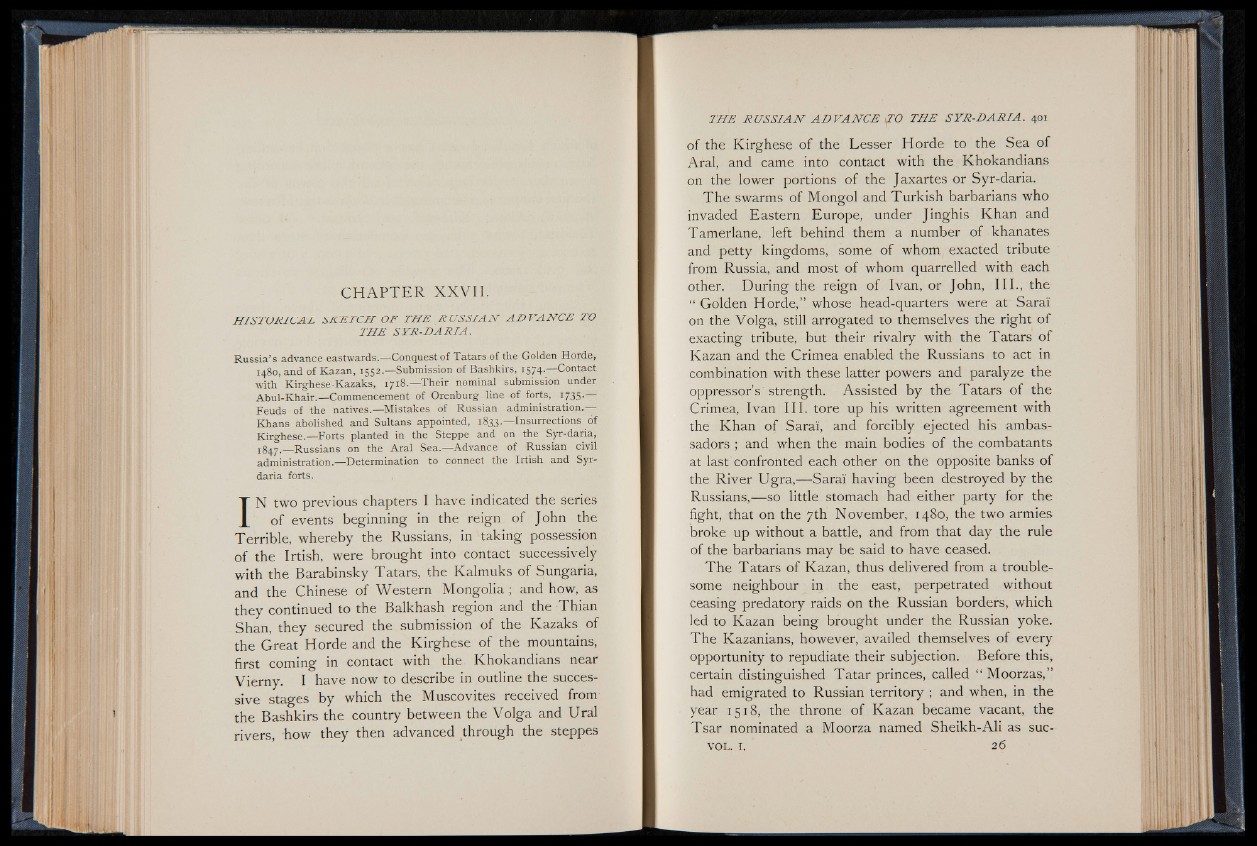
C H A P T E R X X V I I .
HISTORICAL SKETCH OF THE R U S S IAN A D V AN C E TO
THE SYR-DARIA.
Russia’ s advance eastwards.— Conquest of Tatars of the Golden Horde,
1480, and of Kazan, 1552.— Submission of Bashkirs, 1574.— Contact
with Kirghese-Kazaks, 1718.— Their nominal submission under
Abul-Khair.— Commencement of Orenburg line of forts, 1735.—
Feuds of the natives.— Mistakes of Russian administration.—
Khans abolished and Sultans appointed, 1833— Insurrections of
Kirghese.— Forts planted in the Steppe and on the Syr-daria,
r847.— Russians on the Ara l Sea.— Advance of Russian civil
administration.— Determination to connect the Irtish and Syr-
daria forts.
IN two previous chapters I have indicated the series
of events beginning in the reign, of John the
Terrible, whereby the Russians, in taking possession
of the Irtish, were brought into contact successively
with the Barabinsky Tatars, the Kalmuks of Sungaria,
and the Chinese of Western Mongolia ; and how, as
they continued to the Balkhash region and the Thian
Shan, they secured the submission of the Kazaks of
the Great Horde and the Kirghese of the mountains,
first coming in contact with the Khokandians near
Vierny. I have now to describe in outline the successive
stages by which the Muscovites received from
the Bashkirs the country between the Volga and Ural
rivers, how they then advanced through the steppes
of the Kirghese of the Lesser Horde to the Sea of
Aral, and came into contact with the Khokandians
on the lower portions of the Jaxartes or Syr-daria.
The swarms of Mongol and Turkish barbarians who
invaded Eastern Europe, under Jinghis Khan and
Tamerlane, left behind them a number of khanates
and petty kingdoms, some of whom exacted tribute
from Russia, and most of whom quarrelled with each
other. During the reign of Ivan, or John, III., the
“ Golden Horde,” whose head-quarters were at Sarai
on the Volga, still arrogated to themselves the right of
exacting tribute, but their rivalry with the Tatars o f
Kazan and the Crimea enabled the Russians to act in
combination with these latter powers and paralyze the
oppressor’s strength. Assisted by the Tatars of the
Crimea, Ivan III. tore up his written agreement with
the Khan of Sarai, and forcibly ejected his ambassadors
; and when the main bodies of the combatants
at last confronted each other on the opposite banks o f
the River Ugra,— Sarai having been destroyed by the
Russians,— so little stomach had either party for the
fight, that on the 7th November, 1480, the two armies
broke up without a battle, and from that day the rule
of the barbarians may be said to have ceased.
The Tatars of Kazan, thus delivered from a troublesome
neighbour in the east, perpetrated without
ceasing predatory raids on the Russian borders, which
led to Kazan being brought under the Russian yoke.
The Kazanians, however, availed themselves of every
opportunity to repudiate their subjection. Before this,
certain distinguished Tatar princes, called “ Moorzas,”
had emigrated to Russian territory ; and when, in the
year 1518, the throne of Kazan became vacant, the
Tsar nominated a Moorza named Sheikh-Ali as sucvol.
1. . 2 6